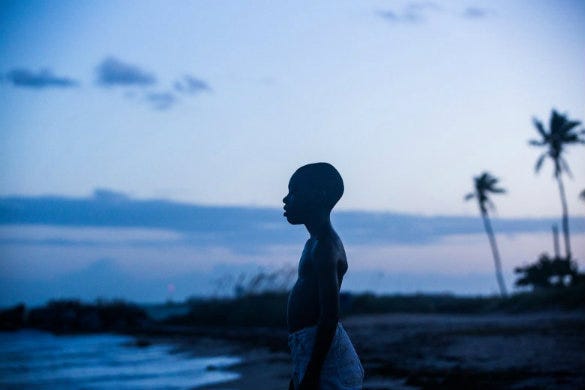Moonlight
In the two short months since its premiere at Telluride Film Festival, indie powerhouse “Moonlight” has garnered the kind of buzz for which most big-budget Oscar contenders can only hope. Masterfully written and directed by Barry Jenkins (“Medicine for Melancholy”), artfully based on an unproduced play by Tarell Alvin McCraney, beautifully shot by cinematographer James Laxton and hauntingly scored by Nicholas Britell, “Moonlight” is the rare film that not only deserves the praise but lives up to every word of it.

A story told in three acts, “Moonlight” follows Chiron — played by Alex Hibbert as a 10-year-old (nicknamed “Little”), Ashton Sanders as a teenager and Trevante Rhodes as an adult (nicknamed “Black”) — as he grows up in Miami and comes to terms with his identity as a gay black man.
In equal turns helping and hindering Chiron’s growth along the way are four key players: his drug-addicted mother, Paula (Naomie Harris), his drug-dealing mentor, Juan (Mahershala Ali), Juan’s girlfriend and Chiron’s substitute mother figure, Teresa (Janelle Monáe), and Kevin (Jaden Piner / Jharrel Jerome / André Holland), a boy whose relationship with Chiron can’t really be categorized by a single word.
But even this cursory summary is reductive and simplistic. Ostensibly, yes, “Moonlight” is about identity and relationships, but that’s not all it’s about. It’s also about black masculinity, as it’s both performed by black men and projected onto them. In a similar vein, as Jenkins himself said in an interview with Rolling Stone, it’s about the way these men talk to each other and the way they don’t talk to each other. And, in arguably the most important way, it’s about all the moments in the past that inform a single moment of honesty and vulnerability with another human being in the present.
Each act in “Moonlight” comes with its own struggle, each one a little more emotionally devastating than the last, and echoes of those struggles are easily felt in each iteration of Chiron as the film progresses. Indeed, the triple casting of the main character along with the rest of the supporting cast is stellar, a strength of the film second only to the atmosphere Jenkins and the rest of his filmmaking team create for these characters to inhabit. Ali is a stand-out, as he always is, and Rhodes as Black deserves some recognition for the visible weight he still carries on behalf of his younger selves.
Also notable is the substance and subversion of archetypes that makes each character in the film real. You’ve probably seen the drug-dealing mentor in other films or television shows about the black experience, but rarely is that figure as nurturing or as humanly broken as Ali’s Juan. And really, if I have one criticism of this movie, it’s that Jenkins didn’t quite take this subversive route as far as he could have with Harris’s Paula or Monáe’s Teresa, but that’s a pretty minor thing considering the scope of the movie. Their roles in the film are just as resonant as Ali’s, if a bit quieter in the grand scheme of things.
All told, “Moonlight” is like lightning in a bottle: contained yet immensely powerful, leaving you with vivid afterimages long after you close your eyes and an ache deep in your chest that you don’t quite know how to remedy. It’s well worth a view as we get deeper into Oscar season, and even more worth your time.
